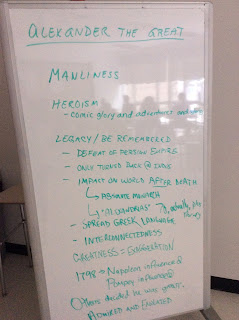Thursday, April 27, 2017
Tuesday, April 25, 2017
Greece Exam Study Guide
Greece Study Guide
100 points on Greek history
30 points on Euro Geo
Section I. The Iliad (Book
1, 6, 23 and 24)
Values at play in the dispute between Agamemnon and Achilles
Burial practices and rituals surrounding the death of
Patroclus
The values embodied by the characters of Hector and Achilles
Section II. Multiple
Choice
Political systems in
the Greek city-states
Monarchy in Mycenae
Aristocracy in Early Athens
Limited Democracy in Reformed Athens
Direct Democracy in Golden Age of Athens
Oligarchy in Sparta
Section III. Matching Key Terms With Appropriate
Definitions
Political systems, Greco-Persian war, and Peloponnesian War
Pericles
Council
of Elders Delian League oligarchy
Socrates Democracy Peloponnesian League aristocracy
Assembly
Citizen Persian view Solon
Leonidas Council of 500 Greek view Cleisthenes
Spartan view Athenian view Battle of Thermopylae Tyranny
Section IV. Sorting
Supporting Evidence from a Scholarly, Reliable Source
Peloponnesian War: Inevitable or Avoidable
You will be required to sort supporting evidence from
Chapter 6 of Thomas Martin’s book on Ancient Greece into two categories, events
that made war inevitable between Sparta and Athens and events that made war
avoidable between Sparta and Athens.
Section V. Short
Answer (5 points)
Athenian democracy
You will be asked to compare Athenian political structure to
our own in terms of equality and participation. Think constitutionally.
Section VI. Short
Answer (5 points)
You will be asked to discuss how the Achilles figure
influenced Alexander the Great.
Monday, April 17, 2017
Sunday, April 9, 2017
The Persian-Greek Wars
Tuesday (7th period) or Wednesday (8th period) Class Debate
Were the Spartans Fighting For A Compromised View of Freedom at Thermopylae?
You will have five sources from which to draw: (1) Chapter 5 of Thomas Martin's Ancient Greece which distinguishes Sparta's oligarchic, militaristic city-state with Athens' developing democracy and naval power; (2) Chapter 6 of Thomas Martin's Ancient Greece which provides a scholarly account of the Persian-Greek Wars; (3) the debate packet with the perspective pieces by Byron Farwell (no) and Paul Cartledge (yes); (4) the videos below.
The format will be the rotating round debate structure we used for the Ashoka debate just before Spring Break. Each side will get a 2-3 minute intro, followed by a series of four minute rounds, concluding with a 2-3 minute conclusion. Individual participation (quality and quantity) will be tracked and graded. May the games (or war) begin!
The format will be the rotating round debate structure we used for the Ashoka debate just before Spring Break. Each side will get a 2-3 minute intro, followed by a series of four minute rounds, concluding with a 2-3 minute conclusion. Individual participation (quality and quantity) will be tracked and graded. May the games (or war) begin!
Defending Sparta from a Spartan or broader Greek perspective
vs.
Attacking Sparta from a Persian perspective
John Green Crash Course World History
History Channel (Last Stand of the 300)
Greek City-States: Divergent Political Systems
PBS: Greek City-States (More Focused on Sparta)
Education Portal: Athens under Solon and Cleisthenes
Ted-Ed Sparta
Ted-Ed What Did Democracy Really Mean in Athens?
Divergent Political Systems: Judging Disputes
Procedure: Break students into five groups and assign each group a different political system: (1) monarchy in Mycanae; (2) aristocracy in Early Athens; (3) limited democracy in Athens amidst reform; (4) direct democracy in the Golden Age of Athens; and (5) oligarchy in Sparta.
You have to resolve a dispute. It involves a wealthy landowner, Odysseus, and one of his poorer neighbors, Alexandros. Alexandros has seen slaves of Odysseus encroaching on his property snooping around. He wants to challenge Odysseus legally, suspecting that Odysseus wants to take part of his land to increase nobleman's own estate. When he brings his claim, Odysseus defends his encroachment on the grounds that his expenses have increased, and he needs the additional land.
Decision-Making Question
1. Who has the power to make this decision?
2. What is the basis of this power?
3. Which side of the dispute will the government favor? Why?
4. What is the likely judgment?
Thursday, April 6, 2017
Analyzing The Iliad as a Source of Greek Values
Here is the link to The Iliad board and typewritten notes from our student-led discussions of Books 1, 6, 23 and 24. You may look at the other class's notes in addition to your class's notes.
Sunday, April 2, 2017
Subscribe to:
Comments (Atom)








